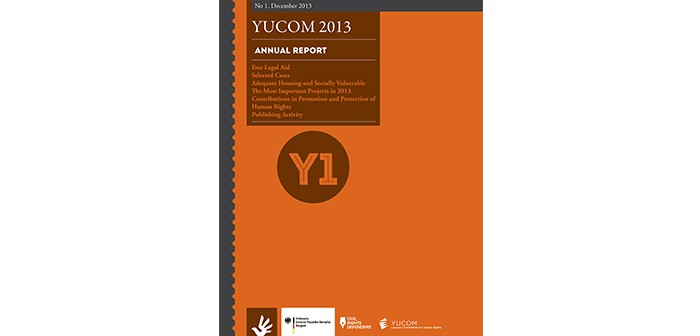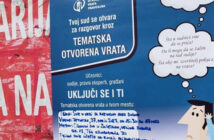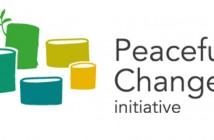YUCOM’s 2013 Annual Report is product of comprehensive all-year efforts and concretization of the idea of an overview of YUCOM’s activities, modeled on annual reports being published by regulatory bodies and by international human rights organizations. As one of the most influencing think-thanks in Serbia and the symbol of support to citizens when it comes to protection of their basic human rightsYUCOM is presenting its first annual report with the review of provided legal aid in 2013 and selected case studies, also with overviewof all the contrbutions to improvement of human rights protection as well as with the text about this issue’s specific theme which is the right of adequate housing of marginalized and socially disandvantiged groups in Serbia.
„When you stand before the results of the work one of a year that is about to end, you can either be satisfied with mthe results or you can expect more. YUCOM always strives for more and we can hardly allow ourselves the time just to enjoy what we have achieved. This motivated us to approach the writing of this report, which is not only an overview
of the activities that we conducted, but also of the highlights of many areas we dealt with in 2013. Through legal help, citizens’ needs, trends in human rights violations and detection of errors of the judicial system, government, politicians, and other institutions and individuals are reflected.
When you are defending citizens, representing them, trying to get an adequate response from the state, or a judgment, decision, or new legislation, it is expected that you see many more imperfections of the system, and errors, both accidental and intentional.
It is not an indication that you want to cause damage, but to establish a new practice of human rights and to enable a wider range of people to enjoy their guaranteed rights. We also pointed out positive examples from practice, where we are pleased with the quality and speed of proceedings and the reactions of the authorities. All of this is necessary
in order to obtain a balanced picture of the situation of human rights from the perspective of the organization that represents citizens and works on strategic, legal, and other documents.
YUCOM has identified a large number of individual cases of discrimination through years of work on the improvement and promotion of human rights, representation of citizens, analysis of regulations and policies, and monitoring of the work of public authorities and other activities. Also, we noted the presence of a more dangerous, systemic discrimination which is often indirect or hidden, making its detection and the legal protection of individuals subject to it much more difficult. Equality in the exercise of the
rights is denied to the entire groups, sometimes because of the provisions and the most important regulations themselves, but more often due to selective enforcement of regulations by public authorities, to the detriment of the groups who already experience stigma, prejudice and segregation in society.Through the analysis of legal and policy framework, monitoring of the implementationof policies of social housing and the provision of legal aid in this area in 2013, YUCOM sought to identify key obstacles in exercising the right to adequate housing of multiply socially endangered groups. The analysis focused on the definition and Qimplementation of affirmative measures to socially disadvantaged individuals so that they could enhance their social status, especially social housing as a basic mechanism for providing adequate housing to the most vulnerable citizens.
Let me remind you that affirmative actions are defined by the Constitution of Serbia and covered by other regulations, but there remains a lack of understanding and implementation.Our cooperation with the government, the National Assembly, certain ministries, and local government bodies shows that it is recognized that human rights organizations have their place in improving the human rights protection system, public administration, as well as ameliorating the points of contact between citizens and the state, such as in court, in drafting legislation, and in many other situations. We emphasize excellent cooperation with independent institutions such as the Ombudsman, the Ombudsman of Vojvodina, the Commissioner for Equality, the Commissioner for Information of Public Importance and Personal Data Protection,as well as local ombudsman and manyothers who have made our work more visible and more effective. In particular, we highlight the media that have recognized the issues we deal with, and the hundreds of interviews and articles that are testament to this.
And, at the end of this introduction, we thank the many organizations in Serbia and in the region and beyond with whom we have worked, with which we have agreed, and with which we have argued in the interest of promoting human rights. We are especially pleased that during this year our team joined many young professionals, as well as future experts, currently students of law and other faculties, who helped in bringing new energy into the organization, but also helped us see how the human rights in Serbia will develop. Only with young people who have a sense of respect for human rights in this country can Serbia become an exemplary country which would be pleasant to live in.“





